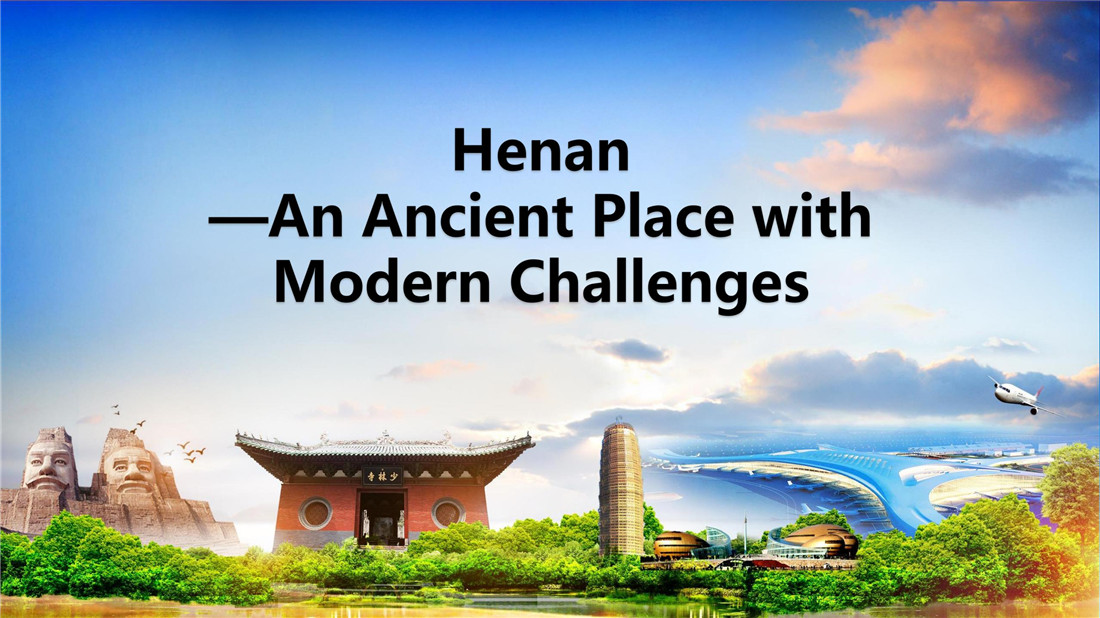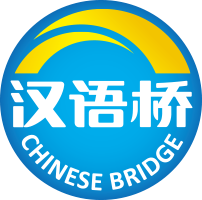A Glimpse of Henan Province
河南省简介

河南省位于中国的中东部,处于黄河与淮河之间的平原上。黄河贯穿河南达700干米,因为大部分地区位于 黄河之南,所以称为河南。河南占地167 000平方干米,近邻河北、陕西、湖北、安徽以及山东。河南省属北亚热带与暖温带过渡区气候,具有四季分明、雨热同期、复杂多样的特点。南部属北亚热带,全 省年平均气温为1 3°C~1 5°C,年平均降水量570-1 1 20毫米。全年无霜期275 ~ 308天。河南地处我国 地势第二阶梯向第三阶梯的过渡带,西部山地绵延起伏,海拔高千米以上,东部为平原,海拔在百米之下。灵宝 市的老鸦岔为全省峰,海拔高度为2413.8米,海拔最低处为淮河出省处,仅23.2米。河南省地势西高东低、北坦南凹,北、西、南三面有太行山、伏牛山、桐柏山、大别山四大山脉环绕,间有 陷落盆地,中部和东部为辽阔的黄淮海冲积大平原。山区丘陵面积占44. 3%,平原面积占55. 7%。境内有 黄河、淮河、卫河、汉水四大水系,其中淮河流域面积53%。
旅游资源
河南是华夏文明的主要发祥地之一。在河南已经发现的7000年前的裴李岗文化遗址、6000年前的仰韶文 化遗址和5000年前的大河文化遗址,在中华民族的发展均有划时代的意义。在中华民族数干年的文明史中, 先后有20多个朝代在此建都或迁都。中国已确定的七大古都河南有其三,即殷商古都安阳、九朝古都洛阳 和七朝古都开封。中国古代四大发明中的指南针、造纸、火药三大技术均发明于河南。河南地下文物居全 国第一位,地上文物居全国第二位。众多的文物古迹和的黄河等自然风光构成了河南丰富的旅游资源。
风味食品
糖醋璃鲤鱼焙面,洛阳"水席",宋宫面,小笼灌汤包子,"套四宝”。
地方文艺
豫剧是河南剧种。此外还有曲剧、越调、河南梆子。
地方特产
河南特产名食有汴京烤鸭,名酒有汝阳杜康酒,其他农特产有碧绿清香、中国十大名茶之一的信阳毛尖等。 此外,河南有很多名优特产品,如原阳大米、新郑大枣、开封西瓜、杞县及中牟大蒜和板栗、西峡购猴桃、 灵宝苹果、焦作四大怀药等。洛阳牡丹驰名中外。
主要旅游城市
郑州为河南省会,地处中华腹地,九州之中,十省通衢,北临黄河,西依嵩山,东、南接黄淮平原。河南洛阳是一 座历史悠久的文化名城,从夏朝以来,有13个王朝在此建都。洛阳因文人云集而得名"诗都”,又因牡丹 花香气四溢而被名为"花都”。开封曾为宋都,直到今天,走在旧时的宋都御街上,仍能想象当时店铺林 立,车水马龙的热闹景象。
主要推荐景点
河南省具有丰富的旅游资源,包括上古文化遗址、太昊陵、东周王陵、北宋皇陵,还有苏秦故里、玄奘故 里、杜甫故里、白马寺、少林寺、相国寺、龙门石窟等古迹值得一游,洛阳太学、嵩阳书院、应天府书院 等古代学府墨香犹存。
Henan Province is located in eastern central China, on the plain between the Yellow and Huaihe rivers. Since most of Henan is south of the Yellow River, which runs for over 700 k m through the province, it was given the name Henan(South of the River). Neighboring H ebei, Shaanxi, Hubei, Anhui and Shandong provinces, Henan covers an area of 167,000 s quare kilometers.
Located between the northern sub-tropical zone and warm temperate zone, Henan has fo ur distinctive seasons with complicated weather conditions characterized by hot and rainy summers. Southern Henan is in the northern sub-tropical zone. The province1 s average y early temperature is 13°C-15°C, the average annual rainfall is 570-1,120 milimeters, and ha s on average 275 to 308 frost-free days a year. Henan Province is in the transitional area b etween the second and third steps of China1 s four-step terrain rising from east to west, with rolling mountains over 1,000 meters above sea level in its western part and plain area that is no more than 100 meters above sea level in its east. The 2,413.8-meter-high Laoyac ha Peak, which is located near Lingbao City, is Henan' s highest mountain. The provinc ez s lowest point, 23.2 meters, is located at the place where the Huaihe River 1 eaves the province.
High in the west and low in the east, even in the north and concave in the south, Henan is surrounded by four mountain ranges, the Taihang, Funiu, Tongbai and Dabie, which sta nd in its north, west and south, leaving subsidence basins here and there. In its middle an d eastern parts there is a vast fluvial plain created by the Yellow, Huaihe and Haihe rivers. Mountainous regions comprise 44.3% of its total area, and the plains, 55.7%. Four rivers run across Henan, the Yellow River, Huaihe River, Weihe River and Hanshui River, with the Huaihe River valley covering up 53%of the province.
Tourism Resources
As one of the major birthplaces of the Chinese civilization, several epoch-making archeolo gical discoveries have been made in Henan, including the Peiligang Culture Site dating ba ck 7,000 years, the 6,000-year-old Yangshao Culture Site, and the 5,000-year-old Dahe Cu Iture Site. More than 20 ancient Chinese dynasties have established their capitals in Hena n. Three of China1 s seven great ancient capitals are located in Henan: Anyang, the Shan g Dynasty* s capital, Luoyang, the capital of nine dynasties, and Kaifeng, the capital of seven dynasties. Three of ancient China1 s four great inventions, the compass, paper-ma king and gunpowder, were made in Henan. More underground cultural relics are located i n Henan than in any other places in China and the province ranks second highest with resp ect to the number of cultural relics on the ground. The Yellow River, with numerous ancie nt relics and scenic attractions, provides Henan another rich tourist resource.
Local Snacks
Notable local snacks and dishes include Liyu Beimian (carp covered with baked noodles in sweet and sour sauce), Luoyang Shuixi (feast highlighted by Luoyang style soup), Songgon g Miangao (pastry originating from the Song Dynasty Imperial Palace).
Local Culture
Yuju (Henan Opera) is the most important opera genre; other operas include Quju, Yue Di ao, and the Henan bangzi.
Special Local Products
The traditional specialties are Bianjing roast duck, Kaifeng Henan embroidery, Xinyang Ma ojian Tea, and Ruyang Dukang Wine. There are also many famous specialties produced in H enan Province, such as Yuanyang rice, Xinzheng Chinese date, Kaifeng water-melon, Qixian and Zhongmou garlic, Xinyang pale coloured tips and chestnut, Xixia Chinese gooseberry, Lingbao apple, Jiaozuo yam and Luoyang peony flowers. Among these specialties, the Luoy ang peony flowers are famous not only in China, but across the world as well.
Tourism City
Zhengzhou is the capital of Henan province. It is of great strategic importance in China as the "Hinterland of nine divisions and thoroughfare of ten provinces" . With the Yellow Ri ver to the north and the Songshan Mountain to the west, Zhengzhou sits astride the Huan ghuai Plain. Luoyang is renowned for its history and served as the capital of 13 dynasties.
It is recognized as the Capital of Poems for its numerous literati and the Capital of Flowers for its peony flowers. During the Song Dynasty (960-1279 A.D.) , Kaifeng was not only Chi naz s political, economic and cultural center, but also one of the most prosperous internati onal capitals. As you walk about its ancient streets today, you can still see many traces of this earlier prosperity.
Attraction Recommendation
Due to its central position in Chinese history, Henan has an abundance of tourist sites and attractions. The places of interest include Songshan and Jigong Mountains, the Eastern Zh ou Dynasty (770-256 B.C.) Imperial Mausoleum, White Horse Temple in Luoyang, Longmen Grottoes, Chancellor Temple in Kaifeng, Shaolin Temple in Dengfeng, Zhongyue Temple, S ongyang and Yingtian Academies of Classical Learning, and Dufu and Xuan Zang former re sidences.


